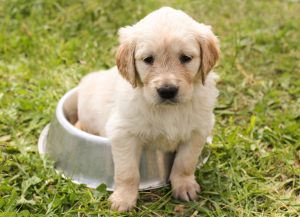Welcoming Your New Puppy
Getting a puppy is a fascinating experience. You’re about to add a new member to your family. This creature is going to spend every waking minute thinking about you, so it’s your job to spend the time preparing for his arrival. A lot of time and research goes into getting a puppy, but overall, you are expected to have patience. To ensure the next few months of your life are a little less stressful, here are a collection of tips we can offer to smooth the transition.
 Create a Routine
Create a Routine
You and your dog can have a schedule for everything: when to go potty, when to eat, when to sleep, and even when it’s playtime. This will help keep both of you on track, and keep all of your hair in your head. Puppies, much like babies, learn a lot from following rules and routines. If you’re able to establish a regimen early on, they will be quick to follow and progress seamlessly through some of the more difficult tasks you pose upon them.
Create Boundaries
Much like the routine, there should be places where you are puppy-free, and places where you are puppy-full. You can set up situations similar to yours so that your puppy feels like he owns his own things, and will feel more comfortable using his things, rather than using yours. This works for beds, and for bowls. By creating these boundaries, you’re allowing them the freedom and comfort to exist in their own space.
Puppy Proofing
If you haven’t experienced wrestling something out of a dog’s mouth yet, you shouldn’t want to try it. Do yourself a favour early on and tidy up all your loose items. Wrap up and hide any important cables; put away any valuable items that seem like great things to chew. In the eyes of a puppy, if it fits in its mouth, it’s more than likely going to end up there. Teething usually appears around the 4-6 month age, and you want to make sure that their teeth end up on appropriate toys and treats.
Get Used to the Glamour
The more you handle your puppy, the better. From bath time to playtime, the more experience the puppy has with people and being touched, the easier of a transition it becomes to groom, vaccinate, and clean. Try to maintain contact with their ears, nails, and teeth, for longer periods each time. This will allow other people, who are meant to handle these parts, easier access. It’ll also keep your puppy in a comfortable and relaxed state.
Practice Loneliness
As sad as this sounds, your puppy needs to be prepared for when you’re gone. If you greet your dog when you return, and say goodbye when you leave, they will feel more comfortable with you coming and going. The goal is to remove all forms of separation anxiety, so they don’t take it out on your furniture. This, along with the comfort in their own space, will help them grow into a very happy dog.
Keep Them Friendly
You’ll want your dog to meet as many people and other dogs as possible. They might be scared of certain people, and their friendly pets, but this will allow them to start understanding the difference between being kind and being aggressive. Dogs learn best from each other, when it comes to potty training, learning tricks, or just hanging out – you’ll find that they learn exponentially when near each other. Try to build some friendships with other pet owners early on. You’ll be able to learn from their stories, experiences, and even get some help when you need a sitter.

You’ll find that puppies grow fast. And, with all these things to keep an eye on, you might lose sight of the bigger picture. You just got a dog. An incredible thing has happened to you, and you are now responsible for a new life. Cherish the experience of being the companion to a creature who is going to spend every waking minute thinking of you, and don’t forget to share a laugh or two.
Article repurposed by: Alyssa Castle
Original Article: Training Tips For New Puppies

 Create a Routine
Create a Routine